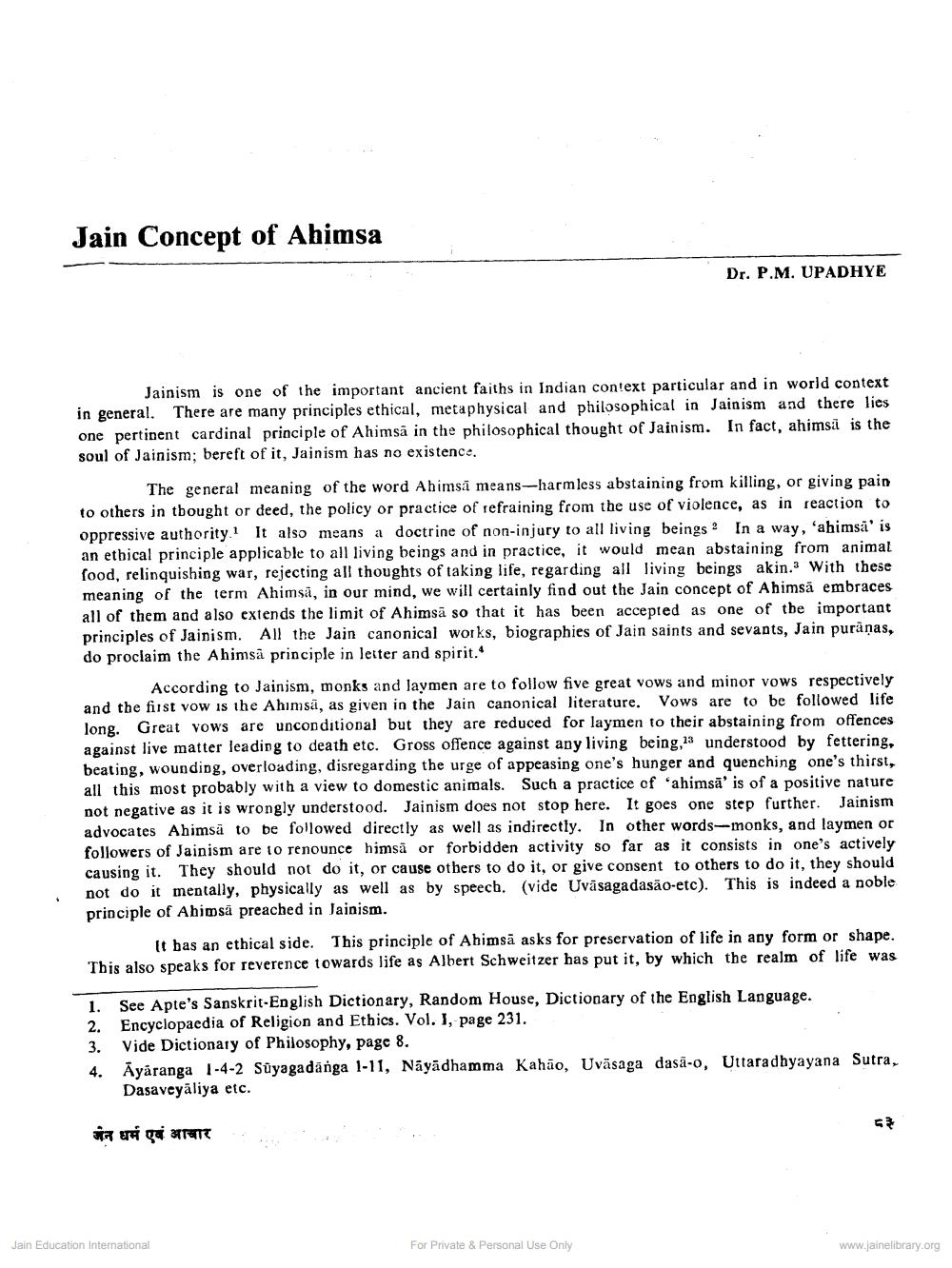Book Title: Jain Concept of Ahimsa Author(s): P M Upadhye Publisher: Z_Deshbhushanji_Maharaj_Abhinandan_Granth_012045.pdf View full book textPage 1
________________ Jain Concept of Ahimsa Dr. P.M. UPADHYE Jainism is one of the important ancient faiths in Indian context particular and in world context in general. There are many principles ethical, metaphysical and philosophical in Jainism and there lies one pertinent cardinal principle of Ahimsa in the philosophical thought of Jainism. In fact, ahimsa is the soul of Jainism; bereft of it, Jainism has no existence, The general meaning of the word Ahimsā means-harmless abstaining from killing, or giving pain to others in tbought or deed, the policy or practice of refraining from the use of violence, as in reaction to oppressive authority! It also means a doctrine of non-injury to all living beings 2 In a way, 'ahimsa' is an ethical principle applicable to all living beings and in practice, it would mean abstaining from animal food, relinquishing war, rejecting all thoughts of taking life, regarding all living beings akin. With these meaning of the term Ahimsa, in our mind, we will certainly find out the Jain concept of Ahimsă embraces all of them and also extends the limit of Ahimsā so that it has been accepted as one of the important principles of Jainism. All the Jain canonical works, biographies of Jain saints and sevants, Jain purăņas, do proclaim the Ahimsa principle in letter and spirit. According to Jainism, monks and laymen are to follow five great vows and minor vows respectively and the first vow is the Ahimsa, as given in the Jain canonical literature. Vows are to be followed life long. Great vows are unconditional but they are reduced for laymen to their abstaining from offences against live matter leading to death etc. Gross offence against any living being, 13 understood by fettering, beating, wounding, overloading, disregarding the urge of appeasing one's hunger and quenching one's thirst, all this most probably with a view to domestic animals. Such a practice of "ahimsā' is of a positive nature not negative as it is wrongly understood. Jainism does not stop here. It goes one step further. Jainism advocates Ahimsā to be followed directly as well as indirectly. In other words--monks, and laymen or followers of Jainism are to renounce himsă or forbidden activity so far as it consists in one's actively causing it. They should not do it, or cause others to do it, or give consent to others to do it, they should not do it mentally, physically as well as by speech. (vide Uvāsagadasão-etc). This is indeed a noble principle of Ahimsă preached in Jainism. It has an ethical side. This principle of Ahimsā asks for preservation of life in any form or shape. This also speaks for reverence towards life as Albert Schweitzer has put it, by which the realm of life was 1. See Apte's Sanskrit-English Dictionary, Random House, Dictionary of the English Language. 2. Encyclopaedia of Religion and Ethics. Vol. I, page 231. Vide Dictionary of Philosophy, page 8. 4. Āyáranga 1-4-2 Süyagadänga 1-11, Nāyadhamma Kahão, Uvāsaga dasã-o, Uttaradhyayana Sutra, Dasaveyāliya etc. जैन धर्म एवं आचार Jain Education International For Private & Personal Use Only www.jainelibrary.orgPage Navigation
1 2
